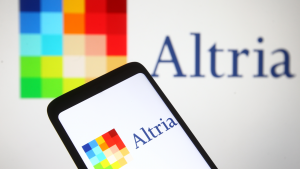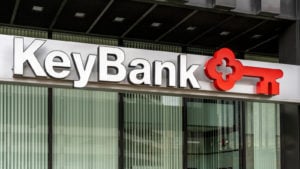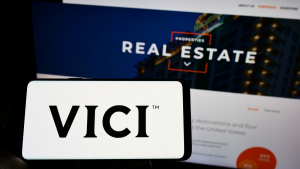Under ongoing economic uncertainty, more than traditional investments may be needed to ensure a comfortable retirement. However, one can unlock a steady income stream by strategically allocating assets to high-yield dividend stocks. Meanwhile, one can benefit from capital appreciation. The article presents potential opportunities for savvy investors, from tobacco giants to real estate titans, to maximize returns.
Read more about these high-yield dividend stocks, their performance, growth trends, and strategic maneuvers. Know what positions them as pillars of retirement planning.
Altria (MO)

Altria (NYSE:MO) offers a high forward dividend yield of nearly 10% with a 5-year growth rate of around 5% and a dividend growth streak of 54 years. Altria supports the dividend payout with solid bottom-line performance. Specifically, Altria grew adjusted diluted earnings per share (EPS) by 2.3% (Q4 2023). Dividends and share repurchases totaled nearly $7.8 billion during 2023, indicating the company’s focus on rewarding shareholders.
Additionally, the company expects adjusted diluted EPS growth of 1% to 4% for 2024, ranging from $5 to $5.15. In this direction, the company’s projected EPS growth suggests its capability to capitalize on opportunities prevailing in the market.
Furthermore, Altria completed the acquisition of NJOY (a smoke-free product company). Fundamentally, the acquisition included strategic steps like strengthening supply chains and expanding product distribution. Hence, Altria’s investments in smoke-free products reflect a strategic focus on diversifying its portfolio. This is in line with shifting preferences away from traditional tobacco products.
Healthpeak (PEAK)

Healthpeak (NYSE:PEAK) boasts a dividend yield (forward) of 7%. Healthpeak’s portfolio performance and leasing activity are vital to its operational edge.
The company has shown robust leasing activity and positive spreads across outpatient medical and lab segments. Healthpeak executed leases for large square footage in outpatient medical and lab spaces during Q4 2023. The company leased 1.1 million square feet, with 743K square feet in outpatient medical and 312K square feet in lab spaces. Hence, this leasing activity reflects solid demand for Healthpeak’s properties.
Furthermore, Healthpeak attained positive leasing spreads on outpatient medical and lab leases throughout 2023. The company reported a +4% cash release spread on outpatient leases and an impressive +23% cash release spread on lab leases. Hence, these positive leasing spreads suggest that Healthpeak could attain higher rental rates upon lease renewals than the previous lease terms.
KeyCorp (KEY)

KeyCorp (NYSE:KEY) provides a near 6% forward dividend yield with a 5-year growth rate of 8%. It is attached to a dividend growth streak of 13 years. KeyCorp’s focus on balance sheet optimization and capital positioning supports its valuation and dividend stability. Due to changes in interest rates and regulatory requirements, the company undertook vital steps to enhance its liquidity and capital adequacy.
In this context, KeyCorp strategically reduced its loans by $7 billion in 2023. The move aimed to optimize its balance sheet and enhance capital efficiency. This reduction was mainly based on a de-emphasis on credit-only and non-relationship business lines. By reducing loans, KeyCorp aims to prioritize full relationships and higher-quality lending. Additionally, the company decreased its risk-weighted assets (RWAs) by $14 billion throughout 2023. This is exceeding the company’s 2023 optimization goal of $10 billion.
Therefore, by optimizing its loan portfolio and RWAs, KeyCorp may continue to boost its capital position, dividend sustainability, and market valuations.
Philip Morris (PM)

Philip Morris (NYSE:PM) presents a forward dividend yield of around 6%, with a 5-year growth rate of nearly 3% and a dividend growth of 15 years. Philip Morris has experienced robust growth in its smoke-free products segment, marking the third consecutive year of positive volumes and high single-digit organic top-line growth.
Fundamentally, smoke-free products have emerged as the driver of profitability. These products contribute to both top-line and gross profit. For instance, smoke-free gross profit increased organically by 19% in 2023. They are outpacing the growth of combustible products. This accelerated growth suggests the growing acceptance and adoption of smoke-free alternatives.
ZYN, Philip Morris’ oral smoke-free product, has delivered solid growth, particularly in the U.S. market. The pro forma volumes are up by over 60% for the year and over 75% in Q4 2023. By doing so, ZYN has significantly contributed to PMI’s smoke-free product portfolio.
Finally, Philip Morris’ flagship smoke-free product, IQOS, continues delivering competitive results. Here, the rollout of IQOS ILUMA, with Philip Morris’ substantial brand equity and commercial infrastructure, has enabled the company to outgrow the heat-not-burn category. Despite holding a massive market share, this growth suggests potential value expansion.
International Paper (IP)

International Paper (NYSE:IP) offers a dividend yield (forward) of over 5%. International Paper has been actively executing cost-reduction initiatives across its operations. These initiatives target efficiency and improving profitability. For example, the company took strategic actions to structurally reduce fixed costs in its mill system and industrial packaging business.
Additionally, solid progress was made in the “Building a Better IP” initiative, which delivered $260 million in earnings benefits in 2023. This consistent focus on cost reduction may continue to boost the company’s competitive edge by improving margins and overall performance.
In detail, the company has delivered operational sharpness, particularly in optimizing costs. Also, it is executing commercial initiatives focused on margin and mix improvement. In 2023, the company reduced fixed costs by 12% year-over-year (approximately $500 million). This reduction was based on the optimization of its manufacturing footprint. It includes the closure of three underperforming facilities and the consolidation of operations in core regions.
Citizens Financial (CFG)

Citizens Financial (NYSE:CFG) provides an over 5% forward dividend yield with a 5-year growth rate above 9% and a dividend growth streak of 2 years.
Citizens Financial holds a solid liquidity position, marked by a loan-to-deposit ratio of 82%. This suggests that the bank has many deposits available to fund its loan portfolio. It is a critical factor in ensuring edgy operations and facilitating lending activities. Theoretically, a loan-to-deposit ratio below 100% signifies that the bank has more deposits than it lends out.
Moreover, the pro forma Category 1 Liquidity Coverage Ratio (LCR) of 117% and 156% liquidity coverage of uninsured deposits indicates the bank’s robust liquidity position. The LCR suggests the bank’s ability to meet its short-term obligations through high-quality liquid assets easily. It has high-quality liquid assets to cover 117% of its net cash outflows over a 30-day stress period. This suggests a solid buffer against liquidity risks.
Finally, the company’s 156% liquidity coverage of uninsured deposits reflects the bank’s capability to handle unexpected outflows. Thus, these factors may continue to attract depositors and breed high valuations.
VICI (VICI)

VICI (NYSE:VICI) has a forward dividend yield of over 5.5%, attached to a 5-year growth rate of 10.05%. The real estate giant has a back-to-back dividend growth of 5 years. Recently, VICI announced an increase in its dividend (effective Q3 2023). This suggests a priority for returning value to shareholders despite adverse conditions in commercial real estate.
The annualized dividend growth rate since 2019 is three times greater than the largest net lease REIT over the same period. This creates prolonged value expansion potential, as VICI may remain a solid dividend yielder.
Moreover, VICI grew considerably in adjusted funds from operations (AFFO) per share earnings in Q3. VICI’s AFFO has a year-over-year increase of 10.7%. Similar to dividend growth, the AFFO growth rate outpaces many other REITs. This suggests the company’s operational edge and revenue-generating capabilities.
Overall, the consistent growth in AFFO per share reflects VICI’s capability to manage its properties progressively. The company can maintain high occupancy rates and capitalize on market demand even during adverse macroeconomic conditions. Hence, these factors decisively support dividend sustainability.
On the date of publication, Yiannis Zourmpanos did not hold (either directly or indirectly) any positions in the securities mentioned in this article. The opinions expressed in this article are those of the writer, subject to the InvestorPlace.com Publishing Guidelines.
Yiannis Zourmpanos is the founder of Yiazou Capital Research, a stock-market research platform designed to elevate the due diligence process through in-depth business analysis.
